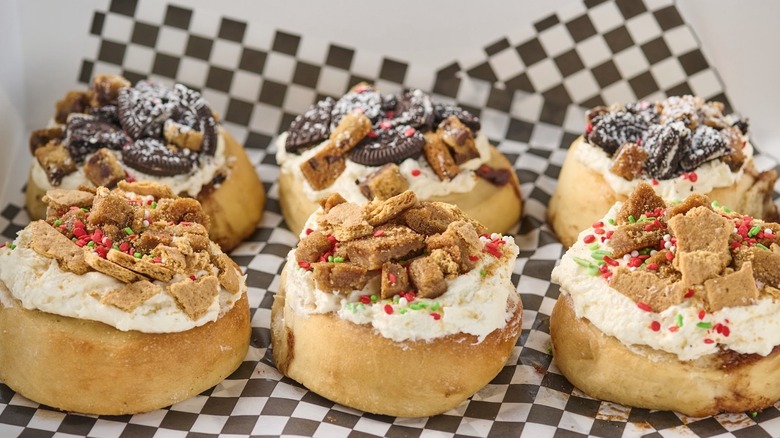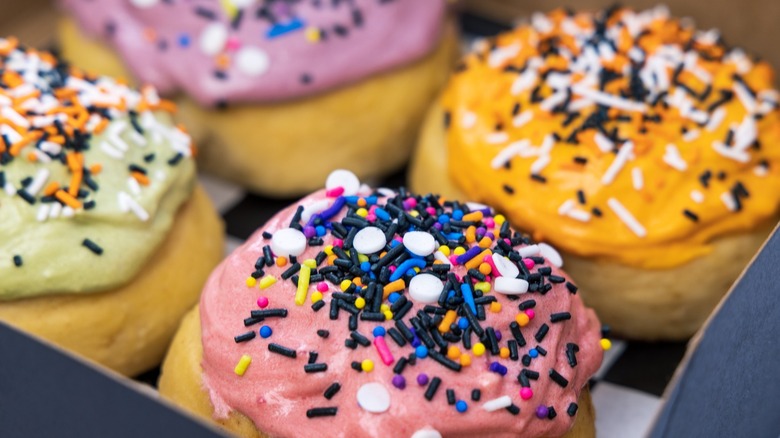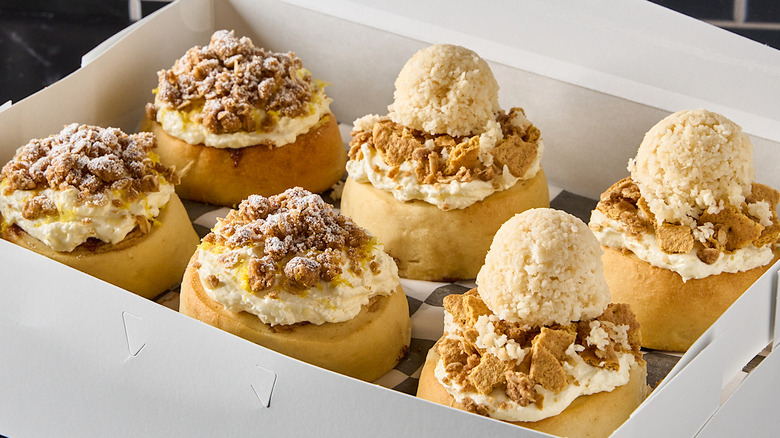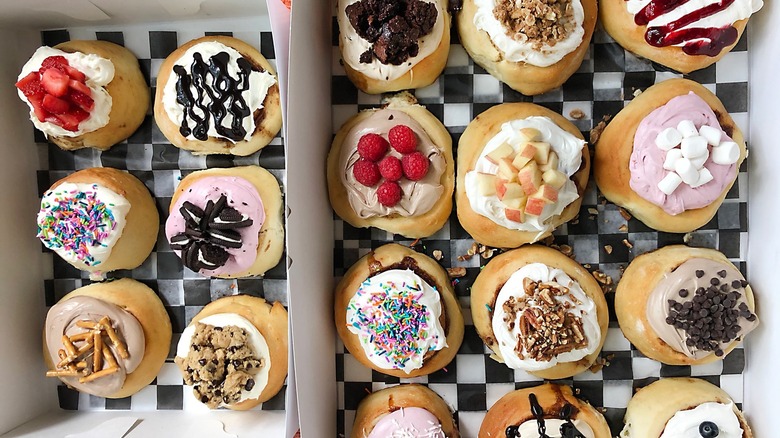Cinnaholic: Here's What Happened After Shark Tank
Not many people can resist the enticing aroma of a soft, freshly baked cinnamon roll. But, with butter, eggs, and cream cheese frosting all part of the ingredients required to make irresistible cinnamon rolls from scratch, not everyone is able to actually enjoy the sweet treats. Anyone that is vegan or has allergies or intolerances to dairy, lactose, or eggs would need an alternative.
An alternative is exactly what Cinnaholic set out to create back in 2010 when founders Shannon and Florian Radke (both vegans) started making gourmet cinnamon rolls free of dairy, lactose, eggs, and cholesterol. The allergen-free buns are also fully customizable, with a choice of about 30 frosting options and 30 toppings ranging from fruit to cookie dough and cereal. Believing that cinnamon rolls were un untapped fast-service market (like Crumbl for cookies or Sprinkles for cupcakes), the Radkes set up shop with a single retail location in Berkeley, California.
Soon enough, their fully vegan rolls proved to be a hit with customers, and by 2014, with just the one hugely popular store in Berkeley, Cinnaholic headed to "Shark Tank" hoping to expand the business and open more locations. But, would any of the potential investors be willing to take a bite, and make a sweet deal?
What happened to Cinnaholic on 'Shark Tank'?
Cinnaholic founders Shannon and Florian Radke appeared on Season 5 of "Shark Tank" in 2014, seeking a $200,000 investment in return for 20% of their company. Upon tasting some samples, the Sharks loved the deliciousness of the fully vegan, generously topped cinnamon rolls, which Shannon also revealed contained just half the calories of their competitors' offerings (theirs topping out at around 450 to 500 calories).
With just one 650-square-foot store in Berkeley, California at the time, Cinnaholic had seen sales of $260,000 the year before its appearance on "Shark Tank." The Radkes said the $200,000 investment would enable them to open another store in San Francisco, and then move to franchising so that Cinnaholic could expand across the country.
Shark Robert Herjavec offered Cinnaholic $200,000 for 40% of the business, but wanted to shift the focus from opening another store to packaging and shipping the buns via online retail opportunities. Kevin O'Leary, who compared the brand to "Shark Tank" success story Wicked Good Cupcakes out of Boston, also wanted to move away from another physical branch. He offered a royalty deal, asking for $1.20 a unit, then dropping to 60 cents a unit once he had recouped the $200,000 initial investment. The Radkes discussed the potential new business model in private, and agreed on Herjavec's deal.
Cinnaholic's success after 'Shark Tank'
Cinnaholic founders Shannon and Florian Radke appeared excited with the deal with they made with Robert Herjavec on "Shark Tank," and braced themselves for an influx of sales. But, things didn't pan out quite according to plan, as the deal with Herjavec ultimately fell through. Instead, Cinnaholic decided to take its business in another direction, and soon turned their attention to franchising, with the aim of opening more brick-and-mortar locations.
This change of focus, which was more in line with the Radkes' original vision for the brand, seemed to pay off pretty quickly. Cinnaholic partnered with the Atlanta Franchise Group, and within just 12 months of appearing on "Shark Tank," had plans to expand across the United States in eight new locations.
By 2016, Cinnaholic had sold over 300,000 vegan cinnamon rolls, and expanded to 13 franchised locations across the country. By 2020, the success had snowballed, as Cinnaholic had already opened 40 venues and achieved record sales, despite the pandemic, thanks to a pivot to provide pick-up and delivery options.
Is Cinnaholic still in business?
Cinnaholic has continued its impressive growth trajectory, and in 2021 alone sold a whopping $20 million worth of vegan cinnamon rolls. The company managed to navigate the pandemic without closing a single store in 2021. And, already boasting 60 franchised stores across the U.S. and Canada that year, Cinnaholic had ambitious plans to open another 25 stores by the end of 2022.
With its popularity growing — even Canadian Prime Minister Justin Trudeau was partial to a Cinnaholic cinnamon roll, according to VegNews — the business had also begun experimenting with new menu items, such as a savory vegan pizza roll and made-from-scratch cookie dough.
But, the original freshly baked cinnamon roll was still the cornerstone of the brand, with each location also partnering with a local coffee roaster to provide accompanying hot drinks on its menu. The company appears to still be growing via its franchise opportunities, with almost 100 Cinnaholic stores currently open across the United States and Canada.
What's next for Cinnaholic?
Cinnaholic stuck to its guns regarding its original plans for expansion, choosing to open brick-and-mortar stores via franchising, rather than focusing on online sales and nationwide shipping (as the Sharks wanted them to do). And, despite losing its "Shark Tank" deal, the business has grown at an impressive rate, from just one store in 2010 to nearly 100 by 2023, with plans for many more in the pipeline.
Cinnaholic continues to promote its new store openings, as well as food and drink offerings, via its popular social media pages, where it has gained 148,000 followers on Instagram and over 343,000 likes on TikTok. With new seasonal treats regularly offered, from a limited-edition pumpkin cheesecake to a Santa's milk and cookies roll, a gingerbread house roll, and chocolate peppermint cookies for the holidays, Cinnaholic looks to be embracing its success with plenty of creative ideas and options for the future.
Back in 2014, Cinnaholic believed that cinnamon rolls were "the new cupcakes" (via Entrepreneur). And given the company's stratospheric growth, it looks like it was right — with or without a Shark onboard. Cinnaholic has become a huge success, and its future looks just as tasty.





